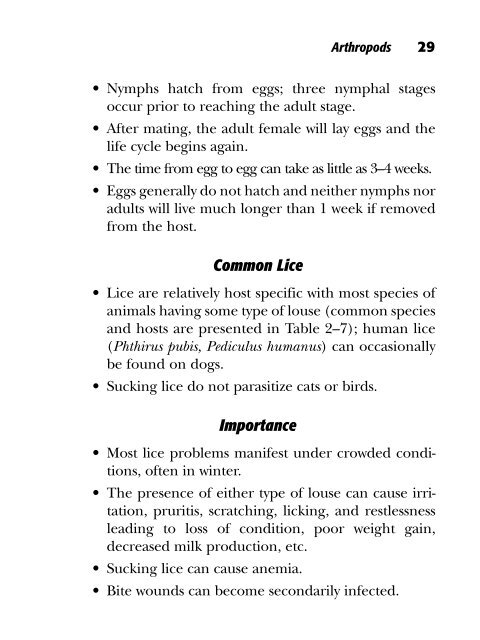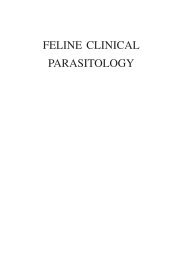- Page 2 and 3: Copyright © 2001 by Butterworth-He
- Page 4 and 5: viii Series Preface help us improve
- Page 6 and 7: x Preface When designing this book,
- Page 8 and 9: xii Preface tion with this subject.
- Page 10 and 11: 2 Introduction member receives neit
- Page 12 and 13: 2 Arthropods Ectoparasites, most of
- Page 14 and 15: • Insects: body divided into thre
- Page 16 and 17: Arthropods 9 • Most ticks cannot
- Page 18 and 19: Arthropods 11 other stages prefer f
- Page 20 and 21: Diagnosis Ticks should be collected
- Page 22 and 23: Mites (Arachnida) Mites can be divi
- Page 24 and 25: Table 2-3 Host, Species, Key Charac
- Page 26 and 27: Common name for facial lesions = sc
- Page 28 and 29: Reportable in some states Skin of l
- Page 30 and 31: Arthropods 23 PNEUMONYSSOIDES (=PNE
- Page 32 and 33: Arthropods 25 coptic mange in dogs.
- Page 34 and 35: thorough cleaning, and high-pressur
- Page 38 and 39: • Trichodectes canis is an interm
- Page 40 and 41: • Heat, carbon dioxide, and movem
- Page 42 and 43: administered at monthly intervals a
- Page 44 and 45: Arthropods 37 • Diagnosis based o
- Page 46 and 47: Arthropods 39 • Resume migration
- Page 48 and 49: • Adult females lay eggs near ent
- Page 50 and 51: gus or spinal cord; destruction of
- Page 52 and 53: Arthropods 45 • Larvae hatch from
- Page 54 and 55: Horse Flies, Deer Flies (Insecta) L
- Page 56 and 57: Life Cycle • Complex metamorphosi
- Page 58 and 59: • Mechanical vectors of infectiou
- Page 60 and 61: 54 Introduction to the Endoparasite
- Page 62 and 63: 56 Introduction to the Endoparasite
- Page 64 and 65: 58 Introduction to the Endoparasite
- Page 66 and 67: 60 Introduction to the Endoparasite
- Page 68 and 69: 62 Introduction to the Endoparasite
- Page 70 and 71: 64 Introduction to the Endoparasite
- Page 72 and 73: 66 Introduction to the Endoparasite
- Page 74 and 75: Table 3-8 Classification of Cestode
- Page 76 and 77: 70 Introduction to the Endoparasite
- Page 78 and 79: 72 Introduction to the Endoparasite
- Page 80 and 81: 74 Introduction to the Endoparasite
- Page 82 and 83: 76 Introduction to the Endoparasite
- Page 84 and 85: 78 Parasites of the Gastrointestina
- Page 86 and 87:
80 Parasites of the Gastrointestina
- Page 88 and 89:
82 Parasites of the Gastrointestina
- Page 90 and 91:
84 Parasites of the Gastrointestina
- Page 92 and 93:
86 Parasites of the Gastrointestina
- Page 94 and 95:
88 Parasites of the Gastrointestina
- Page 96 and 97:
90 Parasites of the Gastrointestina
- Page 98 and 99:
92 Parasites of the Gastrointestina
- Page 100 and 101:
94 Parasites of the Gastrointestina
- Page 102 and 103:
96 Parasites of the Gastrointestina
- Page 104 and 105:
98 Parasites of the Gastrointestina
- Page 106 and 107:
100 Parasites of the Gastrointestin
- Page 108 and 109:
102 Parasites of the Gastrointestin
- Page 110 and 111:
104 Parasites of the Gastrointestin
- Page 112 and 113:
106 Parasites of the Gastrointestin
- Page 114 and 115:
108 Parasites of the Gastrointestin
- Page 116 and 117:
110 Parasites of the Gastrointestin
- Page 118 and 119:
112 Parasites of the Gastrointestin
- Page 120 and 121:
Figure 4-5 Fecal flotation from a s
- Page 122 and 123:
Table 4-3 Partial List of Anthelmin
- Page 124 and 125:
118 Parasites of the Gastrointestin
- Page 126 and 127:
120 Parasites of the Gastrointestin
- Page 128 and 129:
122 Parasites of the Gastrointestin
- Page 130 and 131:
124 Parasites of the Gastrointestin
- Page 132 and 133:
Figure 4-6 Fecal flotation showing
- Page 134 and 135:
128 Parasites of the Gastrointestin
- Page 136 and 137:
130 Parasites of the Gastrointestin
- Page 138 and 139:
132 Parasites of the Gastrointestin
- Page 140 and 141:
134 Parasites of the Gastrointestin
- Page 142 and 143:
136 Parasites of the Gastrointestin
- Page 144 and 145:
138 Parasites of the Gastrointestin
- Page 146 and 147:
140 Parasites of the Gastrointestin
- Page 148 and 149:
142 Parasites of the Gastrointestin
- Page 150 and 151:
144 Parasites of the Gastrointestin
- Page 152 and 153:
146 Parasites of the Gastrointestin
- Page 154 and 155:
148 Parasites of the Gastrointestin
- Page 156 and 157:
150 Parasites of the Gastrointestin
- Page 158 and 159:
152 Parasites of the Gastrointestin
- Page 160 and 161:
154 Parasites of the Gastrointestin
- Page 162 and 163:
156 Parasites of the Gastrointestin
- Page 164 and 165:
158 Parasites of the Gastrointestin
- Page 166 and 167:
160 Parasites of the Gastrointestin
- Page 168 and 169:
162 Parasites of the Gastrointestin
- Page 170 and 171:
164 Parasites of the Gastrointestin
- Page 172 and 173:
166 Parasites of the Gastrointestin
- Page 174 and 175:
168 Parasites of the Gastrointestin
- Page 176 and 177:
170 Parasites of the Gastrointestin
- Page 178 and 179:
172 Parasites of the Gastrointestin
- Page 180 and 181:
174 Parasites of the Gastrointestin
- Page 182 and 183:
176 Parasites of the Gastrointestin
- Page 184 and 185:
Figure 5-3 Cestode egg featured her
- Page 186 and 187:
180 Parasites of the Gastrointestin
- Page 188 and 189:
182 Parasites of the Gastrointestin
- Page 190 and 191:
184 Parasites of the Gastrointestin
- Page 192 and 193:
186 Parasites of the Gastrointestin
- Page 194 and 195:
188 Parasites of the Gastrointestin
- Page 196 and 197:
6 Parasites of the Gastrointestinal
- Page 198 and 199:
Parasites of the Gastrointestinal T
- Page 200 and 201:
Parasites of the Gastrointestinal T
- Page 202 and 203:
Parasites of the Gastrointestinal T
- Page 204 and 205:
Parasites of the Gastrointestinal T
- Page 206 and 207:
Parasites of the Gastrointestinal T
- Page 208 and 209:
Parasites of the Gastrointestinal T
- Page 210 and 211:
Parasites of the Gastrointestinal T
- Page 212 and 213:
Parasites of the Gastrointestinal T
- Page 214 and 215:
Parasites of the Gastrointestinal T
- Page 216 and 217:
Parasites of the Gastrointestinal T
- Page 218 and 219:
Parasites of the Gastrointestinal T
- Page 220 and 221:
Parasites of the Gastrointestinal T
- Page 222 and 223:
Parasites of the Gastrointestinal T
- Page 224 and 225:
7 Parasites of the Cardiopulmonary
- Page 226 and 227:
Pathogenesis and Clinical Signs •
- Page 228 and 229:
Parasites of the Cardiopulmonary Sy
- Page 230 and 231:
Parasites of the Cardiopulmonary Sy
- Page 232 and 233:
Parasites of the Cardiopulmonary Sy
- Page 234 and 235:
Parasites of the Cardiopulmonary Sy
- Page 236 and 237:
Parasites of the Cardiopulmonary Sy
- Page 238 and 239:
Parasites of the Cardiopulmonary Sy
- Page 240 and 241:
Parasites of the Cardiopulmonary Sy
- Page 242 and 243:
Parasites of the Cardiopulmonary Sy
- Page 244 and 245:
Table 7-1 Comparisons of Morphologi
- Page 246 and 247:
Parasites of the Cardiopulmonary Sy
- Page 248 and 249:
Figure 7-1 Fecal flotation from a d
- Page 250 and 251:
Parasites of the Cardiopulmonary Sy
- Page 252 and 253:
Parasites of the Cardiopulmonary Sy
- Page 254 and 255:
8 Parasites of Other Organs Nematod
- Page 256 and 257:
Parasites of Other Organs 251 Skin,
- Page 258 and 259:
Parasites of Other Organs 253 • O
- Page 260 and 261:
Parasites of Other Organs 255 Treat
- Page 262 and 263:
Parasites of Other Organs 257 • P
- Page 264 and 265:
Parasites of Other Organs 259 lymph
- Page 266 and 267:
Parasites of Other Organs 261 Uroge
- Page 268 and 269:
Parasites of Other Organs 263 Ameri
- Page 270 and 271:
Parasites of Other Organs 265 • E
- Page 272 and 273:
Parasites of Other Organs 267 • T
- Page 274 and 275:
Parasites of Other Organs 269 Life
- Page 276 and 277:
Parasites of Other Organs 271 4. Su
- Page 278 and 279:
Parasites of Other Organs 273 • C
- Page 280 and 281:
Parasites of Other Organs 275 • C
- Page 282 and 283:
Parasites of Other Organs 277 • E
- Page 284 and 285:
Parasites of Other Organs 279 insem
- Page 286 and 287:
Parasites of Other Organs 281 Nervo
- Page 288 and 289:
Glossary Aberrant Host: Host in whi
- Page 290 and 291:
Glossary 285 nutritional benefit fr
- Page 292 and 293:
References and Suggested Reading An
- Page 294 and 295:
References and Suggested Reading 28
- Page 296 and 297:
References and Suggested Reading 29
- Page 298 and 299:
References and Suggested Reading 29
- Page 300 and 301:
References and Suggested Reading 29
- Page 302 and 303:
References and Suggested Reading 29
- Page 304 and 305:
References and Suggested Reading 29
- Page 306 and 307:
References and Suggested Reading 30
- Page 308 and 309:
A Abomasum, nematode species in rum
- Page 310 and 311:
C Calliphora spp., 41 Capillaria sp
- Page 312 and 313:
Cows. See Cattle Cryptosporidium sp
- Page 314 and 315:
Ectoparasites, 5 Eimeria spp. chara
- Page 316 and 317:
Horse flies, 47-48 Horses anthelmin
- Page 318 and 319:
Moxidectin for nematodes in cattle,
- Page 320 and 321:
Platynosomum fastosum, 72t, 275-277
- Page 322 and 323:
Strongylus spp. S. edentatus, 101-1
- Page 324:
Trixacarus caviae, 18t, 27 Trophozo



